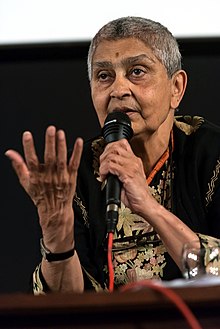
In her famous article ‘can the subaltern speak ?’ Gayatri Spivak gives a negative answer to the question that she herself had posed. We can also find feminists Like Luce Irigaray and Julia Kristeva saying that women cannot speak except in ways preordained by the patriarchal society. They indicate that all cultural discourses especially in the West are univocally masculinist. The only alternative left for women is to speak in a masculine voice or be silent. The same is true of the subalterns. They have spoken in the voice of the elite, dominant classes or castes or remain silent. This speaking in the voices of the oppressive master is thought of mimetic resistance. To get out of this politics of silencing, we have to take up the inspiration of Michel Foucault. To him no discourse is total. There is always room for resistance. Foucault admits that discourse is ambiguous and plurivocal. It is certainly a site of conflict and contestation. Therefore, all subalterns, women included can adopt and adapt language as well as silence to further their own ends. The only caution, if at all it can be given is that the subaltern of all hues and colours has to take care that they do not lead to unwitting capitulation of the very forces that they are resisting.
Foucault’s views on discourse take away logophobia and prepare us to choose to fearlessly speak truth to power. The fact that both those that dominate by exercising power and those that contest power by speaking have no control over their discourse comes counter-discourse possible. This lack of control opens up possibilities for the subalterns to raise their discourse to the level of becoming a counter-discourse and dislodge the reigning discourse. Although Foucault makes room for internalising oppression, he also has enough place for resistance to oppression. Performativity of voice is profoundly political and becomes a politics of recognition. All acts of resistance require us to break the silence that invisibilizes oppression, injury and trauma. While breaking the silence is an important emancipative strategy, maintaining silence can also become a political tool that keeps us away from regulatory power, normative violence and the scorching rays of public exposure. This is why silence cannot be presumed as simply oppressive.
Silence does have a voice. Silence as well as speech makes an attempt to speak truth to power. The power of silence can be subversive. It can be rebellious. The performativity of silence if given a chance has ways of becoming of counter-discourse to the noisy discourse of the elite as well as the rulers. To become resistant silence has to acquire public character. When silence becomes public, it acquires moral power. Its voice then becomes prophetic calling into question the discourse of the dominant. Even before silence becomes public, its subversive nature plants the dominant discourse because it does not offer any oppositional or dialectical response to the discourse of the powerful. Silence, therefore, can be a strategic force. Silence becomes public in conflictual situations when the third onlooker, the people or the crowd begins to hear the voice of silence. This is why the fact that the subaltern cannot speak begins to haunt us.
The voice of silence does have the power to rupture the discourse of the rulers. The governing logos is not political agon properly speaking. It is silence that puts it on trial and it becomes a voice crying to speak the truth. When this happens, we have a conflict between voices. It is not mere speech or logos that is political. It is conflictual voices that make the condition political. When silence, therefore, becomes a voice, silence becomes political. It is at this time, silence paradoxically turns the secretive logos of the rulers to become untrustworthy. It is then that we begin to see the power of silence. The brute voice of silence then becomes a voice that is speaking the brute truth of our life. This is why we may have to agree that the subalterns can speak through the subversive voice of silence. The vocal emission of silence can, therefore, become emancipative.

